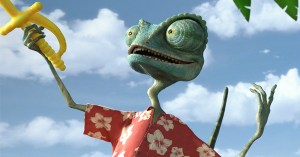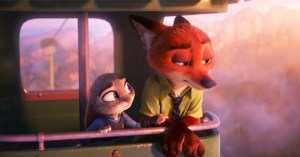Kicking Off Your Career in Film and Television Criticism: Pitching, Budgeting, and Developing a Voice
For the latest RT Lab: Critics Edition, critics from The Hollywood Reporter, New Yorker, Collider, and with freelancing experience offered insights and advice at the Asian American Journalists Association’s 2022 convention.
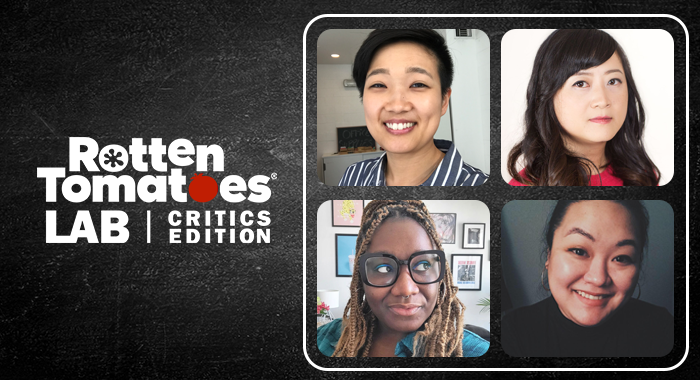
Rotten Tomatoes Lab: Critics Edition is a new series of resources designed to support critics in developing their craft and career, from how-to guides to advice on pitching, publishing, and networking.
In July, Rotten Tomatoes hosted its first in-person Rotten Tomatoes Lab: Critics Edition at the Asian American Journalists Association’s (AAJA) 2022 convention. The Lab is Rotten Tomatoes’ ongoing series of educational resources that provide advice and career development tools for rising film and television critics.
The AAJA panel, titled “Kicking Off Your Career in Film and Television Criticism,” was moderated by The Hollywood Reporter’s Television Critic Angie Han. Our panelists included Inkoo Kang, Television Critic at The Washington Post; Therese Lacson, an editor for Collider, Nerdophiles, and The Beat; and Cate Young, a podcast producer as well as film and culture critic.
These expert critics offered layered tips for pitching, knowing your worth and establishing a budget, as well as navigating ongoing industry barriers. The following conversation has been edited for concision and clarity.
Check out the Critic Resources page for other iterations of the Rotten Tomatoes Lab: Critics Edition, as well as other educational tools for the next generation of critics.
ANGIE HAN: What is film and TV criticism? That seems like a “no-duh” question, but I think we’ve all done a little bit of everything in terms of our writing careers – a little bit of reporting; we’ve written essays, features, interviews, and reviews. What, for you, are the major differences between criticism and features?
THERESE LACSON: As a Features Editor, I would say the biggest difference is that, when you’re writing a review, you are giving your general thoughts and opinions on the film or the television show. Versus a feature, where you’re approaching it like, basically, a school essay – you have a thesis, you have all the evidence and you’re targeting a specific subject… It needs to be very focused.
CATE YOUNG: I’m more experienced in the film review part. For me, the focus has to be on meeting the work where it is and determining the difference between “not good” and “not for me.” That’s always the balance that you have to be working towards, because something can be really good and just not be your cup of tea, and that’s okay.
INKOO KANG: You can think of features as relaying information. Like, “This is the back story behind the production of this thing that that someone made,” or “This is a real life event behind X, Y, Z.” And I think criticism is just being able to look at a movie or a TV show or whatever through someone else’s eyes and gain insight from that different perspective.
The longer I do this, one thing I want to impart is media literacy. I feel a lot of people don’t quite know how to parse something. I think about this with documentaries a lot, because I feel people really love documentaries when they feel connected to the story, or they feel they have a really good experience watching it.
Some years ago, when the Anthony Bourdain documentary Roadrunner came out, there was a Helen Rosner piece where she interviewed the director and she was like, “How did you get recordings of Anthony Bourdain’s voice since he had already died?” And it turned out director had basically pieced together his voice from various recordings that he had made. That to me was a really, really good example of how, you don’t have to be a specialized critic, you can just be someone who’s really careful about how something is made and then question what you are watching.
HAN: When I’m trying to write a review – or bigger feature, but especially with reviews – one question I keep asking myself is: How and why? I just keep asking myself that until I’ve run out of road.
LACSON: It’s really important when writing criticism to look at not just what you’re reviewing, but the world around it. To your point, about documentaries – I feel the same way about, when we’re reviewing fictional films and television shows, looking at how the production was made and some of the actors around it. When I read a really good review, it normally incorporates things that I might not have known or add depth to the actual review.
KANG: The other thing that critics can do – because critics are people who, by virtue of their job description, are supposed to watch as much as possible – they can help contextualize: Is this the kind of story that we hear a lot? Or is this actually something, an innovative story or a community, that we haven’t gotten before? And I think that’s also really useful.
When we are concerned about representation it’s always really important to think about: Yes, this particular type of representation has been made, but what exactly are the parameters under which this accomplishment was able to happen?
The most recent review that I did was of a Neil Patrick Harris show that just came out today called Uncoupled. It’s about a guy who’s in his late forties and he’s starting over as a gay man. And of course there’s so much representational new ground being made there, right? Here’s a middle-aged gay man – not really a framework that easy for a lot of new TV shows – but then it was also really easy to spot all of the ways that it fell short. Here’s another white, cis, fairly masculine-presenting guy who was super thin and supposed to be super hot. People comment constantly about how hot he is!
And it was just like, “Okay, I’m glad we were able to reach this particular milestone, but under what conditions?” That is something I think about a lot as a critic.
YOUNG: What I see criticism, my job as a critic, to be is really to place a work within the larger context that it’s existing in. I lament all the time that I will go back and watch old classic films and not be that impressed. And I’m always like, “I wish I could have seen it when it first came out,” because I feel it probably would’ve made much more of an impact on me then, because I would’ve understood the world that it was coming into.
For contemporary pieces, part of what I think our job is, is to lay out an understanding of what that work of art is doing within the wider culture and what influenced it to exist and what will it influence with its existence. Making those connections, honestly, that’s the part that makes the job fun.
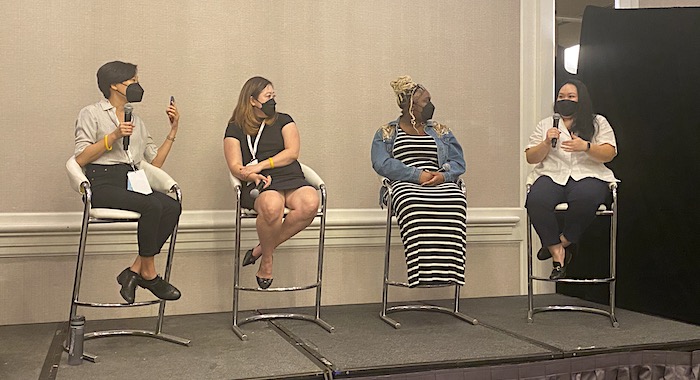
Therese Lacson, editor at Collider and The Beat, speaks at the Asian American Journalists Association’s 2022 convention, at the Rotten Tomatoes panel.
HAN: One thing that’s so key is developing our own unique style, voice, sense of perspective, or sense of taste. For me, and I think for a lot of us, I got that by reading other critics or reading other writers. Who are some of the writers, critics, journalists that you like to read or who have influenced your work?
LACSON: Nancy Wang Yuen (@nancywyuen). She’s a sociologist and she’s also a reporter. She talks a lot about race and racism within Hollywood, and I’ve often found a lot of her takes to be very, very exact. And also, it’s very thoughtful the way she talks about criticism. Reel Inequality is a book that she wrote.
Also Valerie Complex (@ValerieComplex)… Joelle Monique (@JoelleMonique)… Laura Sirikul (@lsirikul)… [and] Max Gao (@MaxJGao), a 20-year-old who’s written for NBC and LA Times, New York Times – very, very talented critic and also very good interviewer.
YOUNG: Angelica Jade Bastién (@angelicabastien). She writes for Vulture. I have followed her writing for a really long time. She’s one of the people who really inspired me to think more critically about films. I’ve learned a lot reading her.
The same I would say for – they’re technically fashion bloggers, but – Tom and Lorenzo (@tomandlorenzo)… It was their recaps of Glee that made me understand how to talk about television.
And Soraya McDonald (@SorayaMcDonald) of Andscape, formally The Undefeated. She covers a range of topics, but her writing is so precise and illuminating.
KANG: For TV criticism, G.O.A.T. Emily Nussbaum (@emilynussbaum) at The New Yorker. I think she is the person whose criticism I have really aspired to, and you learn a lot from where she’s coming from. And at the same time, it’s just such joy to read. Secondly, Kathryn VanArendonk (@kvanaren) at Vulture is just really, really great in terms of spotting new TV trends and anticipating them.
On the film side, I will give a shoutout to Justin Chang (@JustinCChang) at the LA Times, one of those people who knows everything about everything, and it really shows in his writing.
HAN: What a really good critic does is show their work, and show the math, so that even if you come to a different conclusion, you can see their thought process.
YOUNG: It’s almost more interesting to read critics who disagree with your opinion because you start to understand a different perspective on the same material. Everyone is coming to these products with their own biases, their own history, their own beliefs, and so on, and that influences how they react to the media.
One of my favorite examples is from when Eternals came out, the Marvel film. I watched it when it came to Disney+. I ended up really, really loving it. But the movie had been completely trashed and the biggest review of it that I had read was Angelica’s in Vulture, and she basically commented that it was awful. I read the review and I agreed with everything she said, but I still really like the movie!
LACSON: I feel I tend to like things more than I dislike them. And when I hear an opposing point of view, I’m like, “I do agree with you on all that, but I also enjoy the movie.” I think of a really strong critic as somebody who, when you read their criticism, you can sense their voice in it.
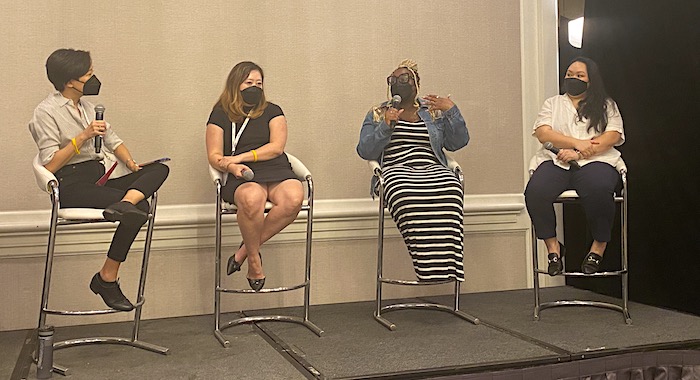
Cate Young, podcaster and freelance film and culture critic, speaks at the Asian American Journalists Association’s 2022 convention, at the Rotten Tomatoes panel.
HAN: When you are writing your reviews, do you have a specific goal or a target audience that you’re writing toward?
YOUNG: I want everyone to read everything I write, but in terms of goals, I definitely feel my primary goal is to assess the film on its own terms.
My favorite example is the Fast and Furious franchise. I’m obsessed with those movies. I don’t think Van Diesel’s getting an Oscar any time soon, but that movie knows exactly what it is and who it’s trying to reach and what it’s trying to accomplish, and it does that very well, even if it’s not Chicago or whatever. That is what earns it higher reviews for me – because it’s operating in its own world and it understands what its audience is looking for from it. And it provides that. And so to me that makes it a successful film.
The opposite is also true, because we can get really pandering Oscar fare that is very self-referential about how much it’s striving for awards, but if it doesn’t actually have anything to say, just the fact that it looks “prestige” does not actually give it any particular value.
LACSON: When I talk to fellow critics, I’m always saying, like, after we watch a Marvel film – out of the thousands of Marvel films that we watch a year – “Oh, well I’m grading it a B+, but this is a B+ within the scope of the Marvel universe” and not compared to a movie that I watched at Sundance. You can’t really compare that because it’s apples to oranges, right?
Whenever I’m writing, I’m trying to write it from the view of: Who is watching this movie? How are they approaching it?
KANG: When I went to The Hollywood Reporter, which is an industry trade, my thinking about my writing really changed because The Hollywood Reporter is the type of publication where, if you work in the industry, you’re probably reading it. If you worked on the show, you’re probably reading it.
When I went to The Washington Post – which is a very consumer-facing, much older, much more affluent audience as a whole – I had to re-grapple with this question.
One of the things I try to do is, in order to get over that “crisis of authority,” think about: What am I bringing that you might not get yourself by watching the TV show? The “value add” is always in the back of my mind because you’re giving opinions, but you also are there to provide a second pair of eyes for your reader.
HAN: Let’s talk about pitching. If you’re a writer, what advice you have for pitching to an editor? And if you’ve been an editor, what do you look for in a pitch and what advice would you give to a writer?
LACSON: I am an editor of multiple outlets… And the thing consistently that we always want to know about in terms of features is: First of all, it cannot be a review. Second of all, it needs to have a solid idea. You can’t just say, like, “Oh, in this piece, I’m going to talk about this and I’ll explain this.” You need to give details. It’s better to give more detail and be very concise than it is to basically turn in what you’re going to write.
Depending on what kind of outlet you’re working for, having a personal perspective is helpful. Especially in a time where we’re talking about diversity and representation, we do seek out people who speak with authority about a culture. When we were covering Ms. Marvel, we wanted people who could speak from a Pakistani point of view. We were looking for people, but we were also not putting the obligation on them. We weren’t saying like, “We only want them to write about that.” We appreciate a personal perspective, and I think that’s always interesting to read; I would always choose that over a very generic feature.
YOUNG: From a freelancing perspective, my advice is practical: Do your research, find your mastheads, know who you should be pitching to. And I agree with you, keep your pitches short and concise. Know what your idea is. And include a couple points of, “This is my conclusion. Here are three bits of evidence to show what you’re thinking about this particular story.”
And the other piece of advice I would give is: Don’t say “yes” to everything just because it’s an assignment. Make sure that it’s worth your time, that it pays enough to be worth your time and that you don’t get overloaded in multiple small assignments that you can’t finish because there’s so many of them. Take the time to invest in the bigger pieces that pay more, that you can spend more time with and really develop your argument.
KANG: As Cate said: Do your research. If you have what you think is a pretty good argument for a piece, just Google it, see if anyone else already wrote that piece.
LACSON: Yes! (all laugh)
KANG: As soon as any editor gets a pitch, that’s going to be the very first thing that they do. And if it turns out someone already wrote a really similar piece, then what’s going to happen is, you are going to have wasted an hour of your time.
HAN: I used to be an editor. I remember, as an editor, some of the pitches I saw were very generic. They’d just be like, “I want to write about the female characters in this film,” and you’re like, “Okay, great, and what about them exactly?”Just keep trying to sharpen whatever angle you think you’re going to do.
You make a really good point about how something that’s personal can be really interesting, but sometimes I would get pitches for things that were almost like personal essays.
You need to be thinking about “Why is this something that everyone should read, that I think I should put out in the world, on a big platform, as opposed to just something that I’m going to be talking about with my family and friends?”
LACSON: You need to convince the reader that you understand what you’re talking about.
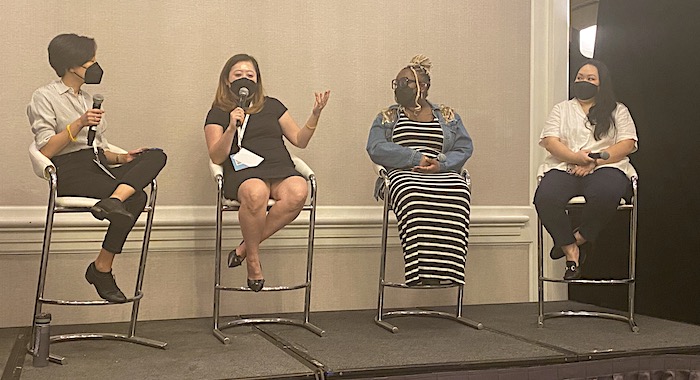
Inkoo Kang, Television Critic for The New Yorker, speaks at the Asian American Journalists Association’s 2022 convention, at the Rotten Tomatoes panel.
HAN: Especially as underrepresented critics, sometimes one of the things that happens is we get pigeonholed. Like, “You’re the girl, do you want to write about this ‘girl issue’?” Or, “You seem like you’re going to be the person that’s going to write about the racial issues of this show, because you’re the person of color.” How do you personally determine whether an opportunity to write about an issue like gender, or race, or sexuality, et cetera – how do you decide whether it’s worth it?
KANG: At this point in my life, I just think about: Do I specifically have anything to offer?
A really good example is, when Squid Game was happening, I got asked a bunch of times, “Hey, do you want to write this?” And I was like, “Not really, I think this show is really bad.” I was like, “Just because I’m Korean doesn’t mean that I have to write about something that’s a Korean show.”
The discourse kept happening. I was like, “No one is actually talking about this from an American POV.” I saw 200 explainers about what Squid Game says about Korea, which is great! Everyone should learn more about other countries and other cultures. But at the same time, no one is actually talking about why this is resonating with Americans, which I think is a more pertinent thing here – because it’s not a wild story that a Korean show is showing in Korea.
I ended up writing about why Squid Game seemed to be resonating with American audiences just because I was like, “Here’s a really obvious angle that is personally very interesting and no one is writing about it.” Did I do a bunch of Googling to see if anyone else did? Yes. And somehow it was not there! So again, TLDR, I felt I had something unique to offer, so I did.
YOUNG: I’ve never been staffed anywhere… I’ve been lucky enough to write across my interests, but I have also done enough writing in my personal life, where I’m known for certain topics as well. You get to figure out what your niche is.
LACSON: I’m Chinese American. I like writing from the point of view of a Chinese American. I do feel a lot of times, because we are Asian, they’ll see an Asian writer and just be like, “Oh, you’re going to write about this Asian thing.” And I feel I do not have the expertise to speak on a Korean television show, right? I’ve obviously grew up watching a lot of dramas, as I’m sure many people have, but I don’t have that cultural connection. And I do feel annoyed when people will be like, “Oh yeah, you can do this.” And I’m like, “Well, no, I can’t because I’m really speaking at it from an American point of view, not from a Korean-American point of view.”
I don’t want to pigeonhole myself, but I do advocate like, “Oh, I do want to talk about this.” Especially where I’m working, like, at Collider, there aren’t a lot of Asian editors.
I do work really hard as an editor to make sure that we are not pigeonholing people. And if somebody does want to write about something, of course we welcome it.
HAN: It’s also important to keep your own limitations, or your own boundaries, in mind. No one should have to take it upon themselves to be like, “I have to write about every Asian thing because no one else will.” Maybe that’s true, but it also doesn’t mean that you need to be killing yourself doing that personally.
And especially if the topic is something that is hard for you to write about, or that hits really close to home, or it’s really personal… Make sure that you’re also protecting your own boundaries: Do I feel good about exposing this part of myself?
LACSON: It is really personal, writing criticism, especially from that angle.
HAN: I mean, one of the most weirdly personal things I wrote had nothing to do with me being an Asian American woman. It was a Charlie Kaufman movie. And I was just, “I feel the way I talk about this is so specific to who I am that I need to be thinking about how much of myself that I want to put out there.”
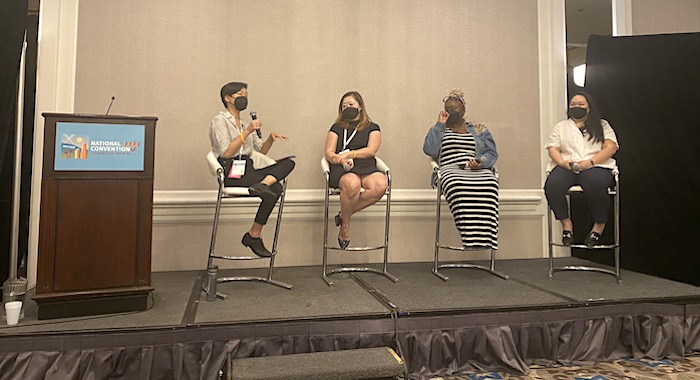
Angie Han, Television Critic at The Hollywood Reporter, moderated the conversation at the Asian American Journalists Association’s 2022 convention.
HAN: This is a really tough industry to break into. What have you found to be the greatest barriers to entry in this industry? And what advice, if any, do you have for overcoming them?
KANG: Money, right? (all laugh) It is not a lucrative field… Review pay: really low. And also because there are so few slots, the competition is basically insane. And I do think a lot of editors basically hire their friends a lot of the time. I don’t think there’s any point in varnishing that truth. It’s really hard.
If you want to break in, I can only speak from my personal experience, but the way that I got seen by more and more people is basically by pitching think pieces and arguments, rather than pitching reviews. It’s so much easier to stand out by saying, “This is my POV on something, and it’s a very specific argument,” as opposed to, “I would like to write a review about X, Y, Z, and by the way, I know there’s 2000 other reviews that you can go look at on Rotten Tomatoes.”
That has always been the thing that I recommend to people who want to break into criticism: Don’t think “review” first.
YOUNG: A lot of it really does come down to money and access… Especially when you’re talking about underrepresented writers, there’s already, so, so, so many fewer slots available. And so you’re fighting, not just against the rest of the industry, but particularly your own peers. And that can be really hard and it can make it easy to give into jealousies and pettiness, because the industry is set up that way.
The real key is to figure out as soon as you can, as clearly as you can, what your actual niche is. What is the thing that you’re going to be the expert on? What’s the thing that you can carry through all of your writing and the perspective that you’re going to have, in a broader general sense that you can utilize across properties? Because that will give you something that sticks out more.
Probably most of us are still doing it for the love of it. I work full time in podcasting now and I write a newsletter, because I feel strained when I’m not writing about film and television, it unsettles me. And so I needed that outlet as well. And I think that is an arrangement that works for me now because it fits into my lifestyle.
LACSON: I would say if you’re getting into this field and you have an idea of what you want to make, you should lower that a little bit. (crowd laughs) I’m just being real!
Like you said, it is something I’m very passionate about. I’ve worked many, many jobs. I’ve been a receptionist. I’ve worked at restaurants. So many of those jobs, I hated that time that I was there – I was counting down the hours; I was, “Five o’clock I’m out the door.” I don’t feel that way about my job now. I truly do enjoy what I do – which is also how they manipulate you, like, “Oh, well, you can just work for the bare minimum, but you’re going to be doing what you love, and you’ll get to speak to people that you love.” But also: I am worth more money!
For a long time, what I was doing was the side hustle. So, so many critics, unless they’re writing for a major trade, are doing it as a side job; they have a “main job.”
For me, a bigger barrier of entry is honestly dealing with publicists and dealing with getting access to things. I’ve written for many small outlets, and when I went to Collider, it was very interesting to see how quickly somebody replied to my email, from a Collider email, versus from my personal email or a different email. Before, I would have to claw and fight my way to just get a screener. Sometimes, if you’ve been doing this job for a while, they just send you things.
There are multicultural publicity groups that are advocating for us, but… I will get offers to only interview Asian cast members. And I’ll be like, “Oh, well I want to speak with a director as well, I want to speak with a star.”
HAN: What is the single best piece of advice you’ve received or the thing that you wish that you had known when you’re starting out?
I’m just going to say: Embrace your editor, or constructive criticism more broadly. I think, especially when you’re younger and less experienced or more insecure, you can feel like, “Oh, I don’t want any negative feedback.” But your editor is there to help you! So don’t be afraid of getting comments, even if they’re not always just, “Great job, no flaws, A+.” They’ve been there too – they were once there pitching and getting rejected.
KANG: With anything that you write, before you submit, read it aloud to yourself.
I do this every single day… with every single piece that I write, I sit my husband down and I’m like, “You will listen to me read this for the next seven minutes.” It’s honestly so helpful! You repeat so many words, you have no idea. That is just a really great proofreading tool I recommend to everybody.
The other thing that’s a lot more review-specific is: Describe a scene. You can say something is a western, you can say something is a comedy. If you really want to give someone a really great sense of what it is that you are reviewing, actually describe a scene and talk about why it’s working or why it’s not working. And then you can convey much better what you’re actually describing.
YOUNG: From the freelance perspective, always ask for more money. You probably won’t get all of it, but you’ll get some. I always ask for $200 more and I usually get half of that. It’s $100 more than you got before.
And don’t double-pitch things. Don’t send the same pitch out to multiple publications at the same time. Because they might both say “yes” and then you have to tell one of them “no.”
LACSON: Don’t limit yourself, don’t put yourself into a box. Obviously know your worth, but take opportunities as they come to you and try to see where you can go in the future from that opportunity. It doesn’t always have to be a review-writing position – as you said, it’s not very easy to get a review-writing position, because normally editors take those.
Don’t limit yourself and have a lot of confidence.
YOUNG: One last thing I would say is actually what my dad used to tell me: Let them tell you “no.” If you want something or a big assignment, just ask. You might get a no, but then you’re in the same position you were when you started, so it doesn’t hurt. And sometimes they say “yes” and then you got a cool assignment!
LACSON: The worst thing they can say is “no,” and that’s fine because literally nothing changed.
Check out the Critic Resources page for other iterations of the Rotten Tomatoes Lab: Critics Edition, as well as other educational tools for the next generation of critics.
Angie Han is Television Critic at The Hollywood Reporter. Find her on Twitter: @ajhan.
Inkoo Kang is Television Critic at The New Yorker, and former Television Critic at The Washington Post. Find her on Twitter: @inkookang.
Therese Lacson is Features Editor at Collider, Founding Executive Editor at Nerdophiles, and Entertainment Editor at The Beat. Find her on Twitter: @bamfpire.
Cate Young is a Podcast Producer at Wondery, as well as a film and culture critic. Find her on Twitter: @battymamzelle.

